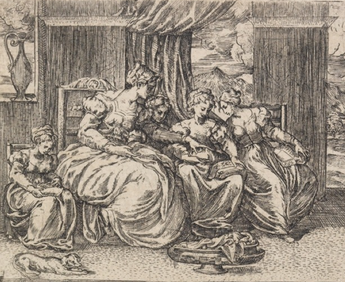 The School of Needlework - Del Moro, 1515-1573
The School of Needlework - Del Moro, 1515-1573 - Make sure that you know the subject well enough to convey it to others. If you are only the barest of beginner in an art form, I would recommend that you wait to share this skill in a formal setting. Often we start to learn a new skill or start following a new line of research and we can become overeager to present what we have found to others. Know that it is more than acceptable to take it slow, gain some more experience in the field, and then develop the materials that will make for a good class.
- Research is important. Make sure they you understand which research is good and which is better and which should be ignored. I do not recommend teaching a class using only another Society’s member’s handouts. Do your own research and your own work (and this in turn, will give you confidence and let you speak in more depth about a topic).
- Is the subject matter of your class SCA appropriate? Is it based on pre-17th century cultures or skills, is it based on SCA specific history or culture (things like our use of heraldry or classes geared towards SCA occupations such as Autocrats or Feastocrats could fall into these categories)? Just because you want to teach something (and can do it competently) does not mean that it belongs in an SCA environment.
- And yes, it is perfectly ok to teach something basic. Many people have websites and teach classes on how to make period tunics, but these classes are always great for newcomers or someone just making their first foray into a more period appearance. Beyond that, it is also good to keep in mind that different people learn in different ways and it might be your class that finally makes something ‘click’ for someone. Do not let the fact that others are teaching a subject deter you.
- Confidence is key and to be confident you have to know your material well. That is not to say you need to be the absolute authority on a subject, but you do need solid groundwork in the requisite skill set or have a firm grasp of the research for the topic.
- Remember that no one knows everything. It is ok to not know the answer to a student’s question. We are not (for the most part) PhDs in our areas and it is completely legitimate to tell the questioner that you do not have an answer but that you can either look into it later and get back to them or refer them to someone who would know the answer.
- Also keep in mind that even a class geared towards the beginner has a likelihood of drawing advanced practitioners of the skill. In most cases, these individuals will be kind and courteous and often add a great deal to the class discussion. Do not be afraid to see Laurels or those you consider experts in your field attend your class! We all have more to learn and they obviously share in your enthusiasm for the topic.
- Never stop being a student. Never be afraid to find out that you were wrong about something and never stop updating your research or practicing your skills. Things change, research progresses and new things become available. A good teacher never stops growing.
- Bring examples to illustrate your topic (if possible and relevant). Images, handouts, things to fondle, all of these are things that might help clarify the subject matter for others. Also remember that everyone learns and retains knowledge in different ways and some people simply learn better through tactile items they can hold or make themselves.
- When possible, provide materials that the students can take home with them. Whether it is a handout or sample that is produced in class or just a card with your website and email, give them that reminder of what they learned and a way to contact you if they have further questions.
- A test run of your class is never a bad thing. I always teach a new class first to members of my household. It gives me a chance to see how long the class will actually run, and it gives me some initial feedback that I can use to improve the flow of the class. Questions these test students ask me during the instruction often point out where I need to make things more clear or where I need to delve deeper into a particular area. It might also be beneficial to have a Laurel or other artisans glance at your material and give you feedback, additional resources or advice on which items and techniques that work best in the classes they offer.
- Are you deathly afraid of public speaking? Try offering small, informal workshops to your local group. You will hone your teaching skills in a comfortable setting while building the confidence to confront a classroom full of eager students.
- And perhaps the most important item of all, continue have fun and enjoy sharing the love you have for your work!
 RSS Feed
RSS Feed